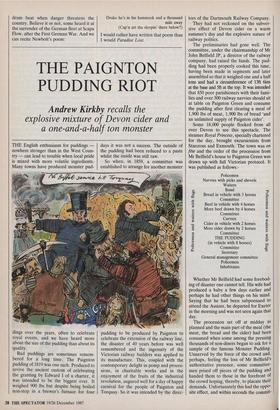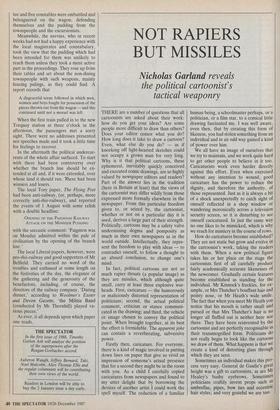THE PAIGNTON PUDDING RIOT
Andrew Kirkby recalls the
explosive mixture of Devon cider and a one-and-a-half ton monster
THE English enthusiasm for puddings nowhere stronger than in the West Coun- try — can lead to trouble when local pride is mixed with more volatile ingredients. Many towns have produced monster pud- dings over the years, often to celebrate royal events, and we have heard more about the size of the pudding than about its quality.
Bad puddings are sometimes remem- bered for a long time. The Paignton pudding of 1819 was one such. Produced to revive the ancient custom of celebrating the granting by Edward I of a charter, it was intended to be the biggest ever. It weighed 900 lbs but despite being boiled non-stop in a brewer's furnace for four days it was not a success. The outside of the pudding had been reduced to a paste whilst the inside was still raw.
So when, in 1859, a committee was established to arrange for another monster pudding to be produced by Paignton to celebrate the extension of the railway line, the disaster of 40 years before was well remembered and the ingenuity of the Victorian railway builders was applied to its manufacture. This, coupled with the contemporary delight in pomp and proces- sions, in charitable works and in the enjoyment of the fruits of the industrial revolution, augured well for a day of happy carnival for the people of Paignton and Torquay. So it was intended by the direc- tors of the Dartmouth Railway Company.
They had not reckoned on the subver- sive effect of Devon cider on a warm summer's day and the explosive nature of railway politics.
The preliminaries had gone well. The committee, under the chairmanship of Mr John Belfield JP, a director of the railway company, had raised the funds. The pud- ding had been properly cooked this time, having been made in segments and later assembled so that it weighed one and a half tons and had a circumference of 13ft 6ins at the base and 5ft at the top. It was intended that 850 poor parishioners with their fami- lies and over 300 railway navvies should sit at table on Paignton Green and consume the pudding after first clearing a meal of 1,900 lbs of meat, 1,900 lbs of bread 'and an unlimited supply of Paignton cider'.
Some 18,000 people flocked from all over Devon to see this spectacle. The steamer Royal Princess, specially chartered for the day, brought excursionists from Starcross and Exmouth. The town was en fete and the order of the procession from Mr Belfield's house to Paignton Green was drawn up with full Victorian protocol. It was published as follows:- Policemen Navvies with picks and shovels Waiters Band Bread in vehicle with 3 horses Committee Beef in vehicle with 4 horses More beef drawn by 4 horses Committee Carvers Cider in vehicle with 2 horses More cider drawn by 2 horses Committee THE PUDDING (in vehicle with 8 horses) Committee Secretary General management committee Policemen Inhabitants Whether Mr Belfield had some forebod- ing of disaster one cannot tell. His wife had produced a baby a few days earlier and perhaps he had other things on his mind. Saying that he had been subpoenaed to attend the Assizes, he departed for Exeter in the morning and was not seen again that day.
The procession set off at midday as planned and the main part of the meal (the meat, the bread and the cider) had been consumed when some among the pressing thousands of non-diners began to ask for a sample of the famous Monster Pudding. Unnerved by the force of the crowd and, perhaps, feeling the loss of Mr Belfield's authoritative presence, some committee- men prised off pieces of the pudding and handed them to those in the forefront of the crowd hoping, thereby, to placate their demands. Unfortunately this had the oppo- site effect, and within seconds the commit'
Policemen and waiters with flags sSeu wet sial►em puv uatuamod
tee and five constables were embattled and beleaguered on the wagon, defending themselves and the pudding from the townspeople and the excursionists.
Meanwhile, the navvies, who in recent weeks had not had a happy experience with the local magistrates and constabulary, took the view that the pudding which had been intended for them was unlikely to reach them unless they took a more active part in the proceedings. They rose up from their tables and set about the non-dining townspeople with such weapons, mainly fencing palings, as they could find. A report records that
A disgraceful scene- followed in which men, women and boys fought for possession of the pieces thrown out from the wagon — and this continued until not a morsel was left.
When the first train pulled in to the new Torquay station at three o'clock in the afternoon, the passengers met a sorry sight. There were no addresses presented nor speeches made and it took a little time for feelings to recover.
In the aftermath the political undercur- rents of the whole affair surfaced. To start with there had been controversy over whether the branch line should be ex- tended at all and, if it were extended, over whose land it should run. There had been winners and losers.
The local Tory paper, The Flying Post had been anti-railway, (or, perhaps, more correctly anti-this-railway), and reported the events of 1 August with some relish with a double headline:
OPENING OF THE PAIGNTON RAILWAY ATTACK ON THE MONSTER PUDDING
with the sarcastic comment: `Paignton was on Monday admitted within the pale of civilisation by the opening of the branch line.'
The local Liberal papers, however, were pro-this-railway and good supporters of Mr Belfield. They carried no word of the troubles and enthused at some length on the festivities of the day, the elegance of the gathering and the generosity of the benefactors, including, of course, the directors of the railway company. 'During dinner,' according to Woolmer's Exeter and Devon Gazette, 'the Militia Band (conducted by Mr Thornhill) played va- rious pieces.'
As ever, it all depends upon which paper one reads.











































































































 Previous page
Previous page